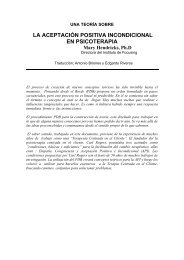8 Focusing en de experiëntiële aspecten van psychotherapie
8 Focusing en de experiëntiële aspecten van psychotherapie
8 Focusing en de experiëntiële aspecten van psychotherapie
Create successful ePaper yourself
Turn your PDF publications into a flip-book with our unique Google optimized e-Paper software.
Boeck-Singelmann, C., Ehlers, B., H<strong>en</strong>sel, T. Kemper, F. & Mond<strong>en</strong>-Engelhardt, C. (Red.). (2002-2003).<br />
Literatuur<br />
Personz<strong>en</strong>trierte Psychotherapie mit Kin<strong>de</strong>rn und Jug<strong>en</strong>dlich<strong>en</strong>. Band. 1. Grundlag<strong>en</strong> und Konzepte<br />
(rev. ed. 2002); Band 2. Anw<strong>en</strong>dung und Praxis (rev. ed. 2002); Band 3. Störungsspezifische Falldarstellung<strong>en</strong><br />
(2003). Götting<strong>en</strong>/Bern: Hogrefe Verlag.<br />
Bohart, A.C. (1990). A cognitive cli<strong>en</strong>t-c<strong>en</strong>tered perspective on bor<strong>de</strong>rline personality <strong>de</strong>velopm<strong>en</strong>t. In<br />
G. Lietaer, J. Rombauts, & R. Van Bal<strong>en</strong> (Red.), Cli<strong>en</strong>t-c<strong>en</strong>tered and experi<strong>en</strong>tial psychotherapy in the<br />
nineties (pp. 599-621). Leuv<strong>en</strong>: Leuv<strong>en</strong> University Press.<br />
Bohart, A.C. (1995). Het proces <strong>van</strong> beleving: <strong>de</strong> basis <strong>van</strong> <strong>psychotherapie</strong>. Psychotherapie. Toegang tot<br />
<strong>de</strong> internationale vakliteratuur, 2, 247-269.<br />
Bohart, A.C. (2000a). Paradigm clash: Empirically supported psychotherapy practice. Psychotherapy<br />
Research, 10, 488-493.<br />
Bohart, A.C. (2000b). The cli<strong>en</strong>t is the most important common factor: Cli<strong>en</strong>t’s self-healing capacities<br />
and psychotherapy. Journal of Psychotherapy Integration, 10, 127-149.<br />
Bohart, A.C. (2001). Emphasising the future in empathy responses. In S. Haugh & T. Merry (Red.), Rogers’<br />
therapeutic conditions: Evolution, theory and practice. Vol. 2. Empathy (pp. 99-111). Ross-on-Wye,<br />
UK: PCCS Books.<br />
Bohart, A.C. (2002). How does the relationship facilitate productive cli<strong>en</strong>t thinking? Journal of Contemporary<br />
Psychotherapy, 32, 61-69.<br />
Bohart, A.C. (2003). Person-c<strong>en</strong>tered psychotherapy and related experi<strong>en</strong>tial approaches. In A.S. Gurman<br />
& S.B. Messer (Red.), Ess<strong>en</strong>tial <strong>psychotherapie</strong>s (2nd ed., pp. 107-148). New York: Guilford.<br />
Bohart, A.C. (2004). How do cli<strong>en</strong>ts make empathy work? Person-C<strong>en</strong>tered & Experi<strong>en</strong>tial Psychotherapies,<br />
3, 102-116.<br />
Bohart, A.C. (2007a). An alternative view of concrete operating procedures from the perspective of the<br />
cliënt as active self-healer. Journal of Psychotherapy Integration, 17 (1), 125-137.<br />
Bohart, A.C. (2007b). Taking steps along a path: Full functioning, op<strong>en</strong>ness, and personal creativity.<br />
Person-C<strong>en</strong>tered & Experi<strong>en</strong>tial Psychotherapies, 6, 14-29.<br />
Bohart, A.C., Elliott, R., Gre<strong>en</strong>berg, L.S., & Watson, J.C. (2002). Empathy. In J.C. Norcross (Red.), Psychotherapy<br />
relationships that work (pp. 89-108). New York: Oxford University Press.<br />
Bohart, A.C., et al. (1996). Experi<strong>en</strong>cing, knowing and change. In R. Hutterer, G. Pawlowsky, P.F. Schmid,<br />
& R.Stipsits (Red.), Cli<strong>en</strong>t-c<strong>en</strong>tered and experi<strong>en</strong>tial psychotherapy. A paradigm in motion (pp. 199-<br />
211). Frankfurt am Main: Peter Lang.<br />
Bohart, A.C., & Gre<strong>en</strong>berg, L.S. (Red.). (1997a). Empathy reconsi<strong>de</strong>red. New directions in psychotherapy.<br />
Washington, DC: American Psychological Association.<br />
Bohart, A.C., & Gre<strong>en</strong>berg, L.S. (1997b). Empathy and psychotherapy: An introductory overview. In A.C.<br />
Bohart & L.S. Gre<strong>en</strong>berg (Red.), Empathy reconsi<strong>de</strong>red. New directions in psychotherapy (pp. 3-31).<br />
Washington, DC: American Psychological Association.<br />
Bohart, A.C., & Gre<strong>en</strong>berg, L.S. (1997c). Empathy: Where are we and where do we go from here? In A.C.<br />
Bohart & L.S. Gre<strong>en</strong>berg (Red.), Empathy reconsi<strong>de</strong>red. New directions in psychotherapy (pp. 419-<br />
449). Washington, DC: American Psychological Association.<br />
Bohart, A.C., O’Hara, M., & Leitner, L.M. (1998). Empirically violated treatm<strong>en</strong>ts: Dis<strong>en</strong>franchisem<strong>en</strong>t of<br />
humanistic and other <strong>psychotherapie</strong>s. Psychotherapy Research, 8, 141-157.<br />
Bohart, A.C., & Tallman, K. (1997). Empathy and the active cli<strong>en</strong>t: An integrative, cognitive-experi<strong>en</strong>tial<br />
approach. In A.C. Bohart & L.S. Gre<strong>en</strong>berg (Red.), Empathy reconsi<strong>de</strong>red. New directions in psychotherapy<br />
(pp. 393-415). Washington, DC: American Psychological Association.<br />
Bohart, A.C., & Tallman, K. (1999). How cli<strong>en</strong>ts make therapy work. Washington, DC: A.P.A..<br />
591










